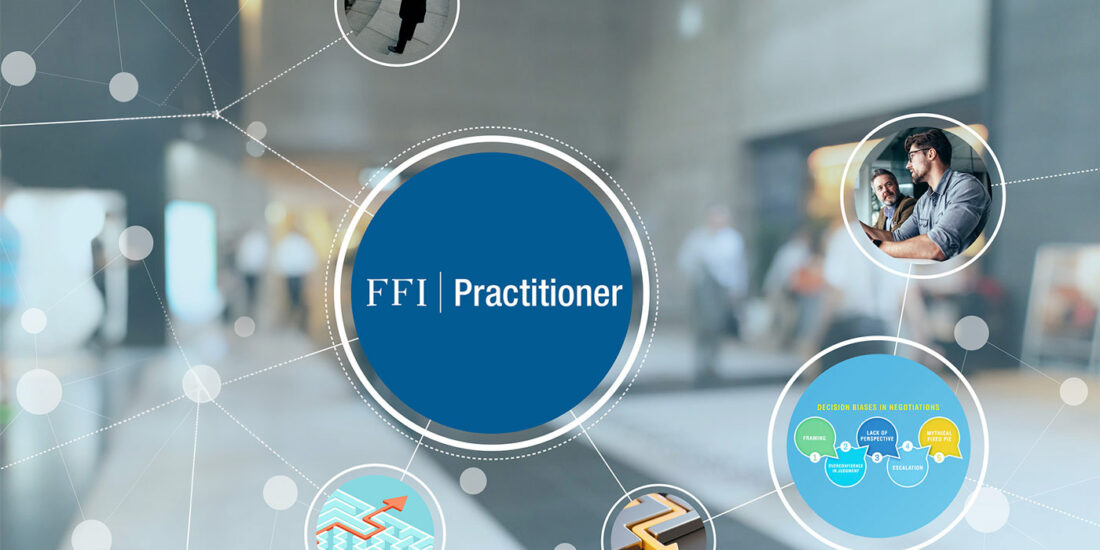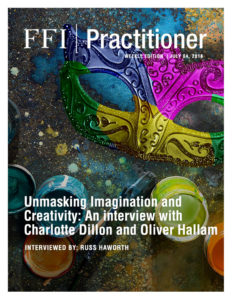
View this edition in our enhanced digital edition format with supporting visual insight and information.
How can advisers utilize the creative process and even mask-making to help family businesses address and resolve conflict? For this week’s edition, we are thrilled to share an interview between Russ Haworth, host of the Family Business Podcast, and Charlotte Dillon and Oliver Hallam about their presentation at the upcoming FFI Global Conference. Their presentation is titled “Unmasking Imagination and Creativity” and will be a mask-making workshop to explore how creativity can mediate family business solutions.
Russell Haworth (RH): Hello, and welcome to this week’s edition of FFI Practitioner, a publication brought to you by the Family Firm Institute.
I’m Russ Haworth and for this week’s edition, I had the privilege of speaking with Charlotte Dillon and Oliver Hallam about their presentation at the upcoming FFI Global Conference in London from October 24-26. Their presentation is titled “Unmasking Imagination and Creativity” and will be a mask-making workshop to explore how creativity can mediate family business solutions.
Charlotte Dillon is an artist and co-founder of RoundTable Global, which is dedicated to learning and development by bringing the creative and corporate worlds together for mutual benefit and learning. Charlotte’s role is reconnecting people with imagination, creativity, and play, which enables people to find out more about themselves and how they perceive the world around them.
Oliver Hallam is an accredited mediator and independent family business consultant who helps business families find workable solutions to a wide range of emotive and contentious disputes. I’m delighted to be joined by Oliver and Charlotte.
So Oliver, starting with you, perhaps could you tell us a bit more about your views on conflict in the family enterprise and among the family enterprise members. When does it typically arise and how do the variety of emotions in the family system exacerbate or mediate the situation?
Oliver Hallam (OH): Well, thanks, Russ, for inviting us to join you on this podcast. I think conflict is everywhere. It’s in all human activity and in every relationship we create. I try to call conflict a challenge rather than a problem because it is part of everyday life. It’s particularly acute in the family setting, and I think it’s even more acute in the family business setting, where there are even more forces and currents pushing and pulling the dynamics in the family and the business. Where does it arise? I see it in two key areas. One is the sort of catastrophic event that the family has no plan for. The other area, I find, is where there’s a sort of long-term accumulation of ambiguity in the family.
I think the catastrophic events are self-explanatory, really. It’s a family being forced into great change all of a sudden, and though many families can survive some of the hardest things that life throws at us, sometimes they’re knocked so hard and so far out of kilter that they find themselves outside that comfort zone and they’ve got no plan to revert to. And it’s at that moment of crisis, that they find their individual beliefs become polarized and individual personalities and expectations start coming out. And as people’s expectations aren’t met, they feel like they’re not being heard and conflict deepens.
And then the other side is this area of ambiguity. I think it’s this long-term slow burn, the sort of ticking time bomb where families are avoiding having the difficult conversations. Issues build up over time, awkward issues — ownership, money, power responsibilities, roles, boundaries. If they’re not dealt with, then, I think, that topics build up inside people’s heads and inside their minds to the point where it just becomes too difficult to talk about. But when they do finally come out, it’s pretty calamitous, and there’s a real risk of serious fallout because you get multiple members of the family feeling that their expectations aren’t being met and that the assumptions that they’ve been living by for previous years — thinking about the status quo — were all wrong. And then relations can deteriorate pretty dramatically.
So yes, I would say that the variety of emotions in the family system do exacerbate conflict because I think everything’s so raw with family members. We’re all willing to forgive and forget so much more when we’re dealing with a family member, but when we’ve had enough, and we feel just completely outraged by what we see as the unfairness of everything, we’re vulnerable to a huge fallout because it goes right to the heart of the values that we grow up to believe in. And that’s what pushes people into their trenches and when they find it really difficult to get out.
RH: Fantastic. The session that we’re looking forward to in October is looking at how creativity can help in such situations. So Charlotte, how do you use the creative process to help members of family companies when conflicts arise — or how does stimulating creativity and empowering people of all generations and allow them to think differently about themselves and others to allow new ideas to come to the fore or bring about positive change?
Charlotte Dillon (CD): So I felt passionately, having worked in many different countries all over the world with different ages, genders, religions, and families of wealth of all sorts, that we have the same basic emotions underlying a lot of our actions, but we’re all completely individuals, and a lot of this process is about identifying and embracing the uniqueness of each person within the family unit. I mean, creativity as a process helps us to identify a variety of personality traits, if you like, and reflect upon how we communicate to the outside world. So, for example, it can show us how we do things. Our modus operandi. I’ve run many workshops where you’ll have certain personalities in the room, and some people will gather their stuff together and when they feel comfortable with everything that they have in front of them, they then go into the creative action.
Other people watch others first or consult others first. Or maybe you’re fiercely independent, and you don’t want to listen to instructions. You want to work out yourself. Or there’s intuitive decision-making, you know, being in the moment and going with the flow and reacting to your environment.
So all of these processes, when you do a creative activity, become revealed and can reveal parallels to our behavior at work, in the home, generally throughout our lives. Our modus operandi is revealed, but it can also take us to a place about how we learn, how we absorb information, how we reflect on that information, what excites us, or maybe what scares us or blocks us. You know, when you’re doing creative process, you go through different emotions, and sometimes it’s frustration or disappointments.
And if you could reflect with a bit more depth on these emotions, you’ll discover ways of being where you’re at right now. And it’s also about being in that moment. There’s quite a lot of work done on personality tests, whether it be Myers Briggs or the likes of insights and things like that. What they do is give you a color or some initials to tell you what you’re like — and it’s in a way, it’s a bit of a label. It puts you in a space that dictates that you are that type of person. But as life goes on, and especially when we’re sort of confronted with catastrophic events or changes, different parts of your personality might come out. So a lot of the creative process is about reflecting where you are right now, how you feel about things right now, and getting rid of labels, which I’ll explain a bit more. It also engages you with your authentic intuition.
So simply, how do we make decisions? How do we decide what we like, or how do we know what makes us feel happy or angry? Or how quickly are we plugged into ourselves and being authentic to ourselves, being really, really honest with ourselves. Or how much are we second guessing what other people might like and making that decision. I think when you bubble it down, being really honest with yourself in the decision-making process is kind of key to effective communication. And that’s part of the creative process, which is great fun. One of my favorite moments was watching people get the realizations about where they’re at right now. And at the end of the process it was quite rewarding. But the main thing, I mean at RoundTable Global, we feel passionately about changing perceptions. And one of the main things is labels.
So, in family business we have hundreds of them, you know — father, son, mother, daughter, owner, director, employee, boss — that’s a tiny, tiny fraction. There are hundreds and hundreds of labels around us all the time. People’s perceptions of us are based on these labels and huge amount of expectations. So by creating an environment where you’re coming up with your unique identity as you stand right now is putting yourself very much in a space where you’re understanding how you feel and how you think, and then your perception of the world around you can change. A lot of it is about opening the doors to change and allowing that change to happen.
And then there’s two other worlds, two other parts of it. So imagination — imagination is so important, it’s the key to our future, really. You know, the world is changing at a rapid pace with all the technologies and everything that we, the systems and the global communication and companies, need to be competitive. You’ve got the family side of it, but you’ve also got the business side of it. You have to stay at the forefront to be competitive.
And families need to be creative and imaginative on how to move forward and identify different skill sets within the family to keep it moving, keep it at the forefront. It is proven that your imagination is like a muscle. So you have to exercise it, by being creative and playful, you’re tapping in to your imagination and when you go into what is described as an Alpha brainwave state, it’s a kind of wait for relaxation. It’s almost meditation. When you’re doing something creative, you go into a different state which allows bigger ideas and solutions to come that wouldn’t necessarily come when you’re in an everyday state of mind. So there’s many, many benefits to the creative process, and I think getting people to reconnect with that is a key part for them to find out who they are and how they feel about stuff.
RH: Fantastic. I’m really looking forward to the session in October and with that in mind, bearing in mind that our listeners are seasoned professionals in the field of family enterprise advising, Oliver, can you explain how this approach can be used in the wide range of consultancies that are going to be represented there?
OH: Sure, absolutely. I come back to what we were trying to achieve — in that by the time families engage consultants or mediators they’re often already stuck. We’re hoping to help families unblock the communication blockages that are dragging them and their company down — to free up the cogs in the family machine that are no longer meshing. So how can advisers do that? Well, I really believe that the strongest solutions come from the family themselves, and we, as advisers, are maybe not right to tell the family the best way to do things. Families are unique units and they’ve developed their own sort of organizational systems. But what we’re asking the family to do is make something of their own, to find their authentic selves, find that confidence and find out the way they do things. And when you create, you start to abandon your limitations and use your intuition.
And this approach, I think, can be used by a wide range of consultancies. We unite a gray suit –that’s me, the mediator solicitor — with the creative — that’s Charlotte — because families are often not, not ready to embrace a formal legal or accounting solution at this stage, but if people stimulate their creativity and use imagination, they can start the journey to resolving their own problems. They can see themselves and their family as the individuals beneath the labels, and in that mindset they can seek lasting solutions for the family. I think, you know, how great if a family can find a way to resolve life’s many conflicts positively with keeping that strong social bond and focus. It’s creativity and imagination on forward looking innovation for the future of their family and their business. So, we’re really looking forward to October. It’s going to be challenging and innovative, and most of all it’s going to be lots and lots of fun so we can’t wait.
RH: Fantastic. And as I said, I’m very much looking forward to the session. I’m sure those listening will be equally as excited as well. Thank you for your time and for now — until October. Thank you very much.
About the contributors
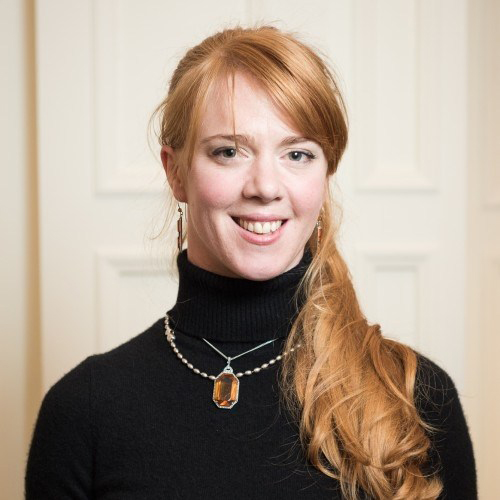 Charlotte Dillon is head of house design and co-founder of RoundTable Global in London. She also co-founded Kinetica Museum, the first UK kinetic art museum combining art and technology. She can be reached at [email protected].
Charlotte Dillon is head of house design and co-founder of RoundTable Global in London. She also co-founded Kinetica Museum, the first UK kinetic art museum combining art and technology. She can be reached at [email protected].
About RoundTable Global
RoundTable is a new kind of organization where talented contributors from around the world are empowered to work in partnership with clients to create exciting solutions without the constraints of unnecessary infrastructure and hierarchy.
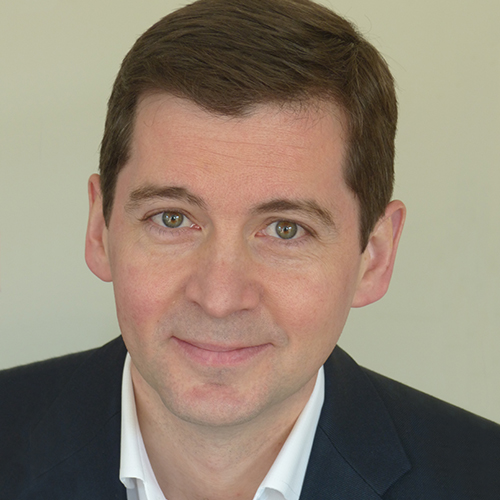 Oliver Hallam is an accredited mediator and independent family business consultant. He helps families with intergenerational succession and inheritance issues to make plans for the future of their businesses before conflict and costs escalate finding workable solutions to a wide range of emotive and contentious disputes. He can be reached at [email protected].
Oliver Hallam is an accredited mediator and independent family business consultant. He helps families with intergenerational succession and inheritance issues to make plans for the future of their businesses before conflict and costs escalate finding workable solutions to a wide range of emotive and contentious disputes. He can be reached at [email protected].
About Oliver Hallam Mediation
Oliver Hallam Mediation is a niche nationwide mediation practice helping private clients to find ways to resolve a wide range of disputes privately and cost effectively.
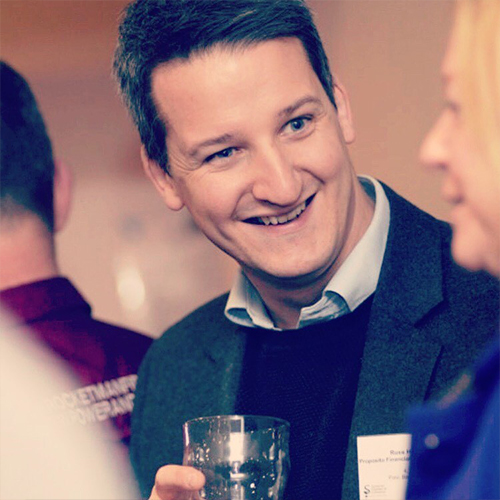 Russell Haworth is a chartered financial planner with Proposito Financial Planning and a family business consultant based in the UK. He is the host of The Family Business Podcast, which is part of a wider educational and support initiative for family businesses from The International Centre for Families in Business. He can be reached at [email protected].
Russell Haworth is a chartered financial planner with Proposito Financial Planning and a family business consultant based in the UK. He is the host of The Family Business Podcast, which is part of a wider educational and support initiative for family businesses from The International Centre for Families in Business. He can be reached at [email protected].
About Proposito Financial Planning
Proposito Financial Planning specialize in working with family businesses to assist them with the transition of wealth and ownership between generations.

View this edition in our enhanced digital edition format with supporting visual insight and information.





